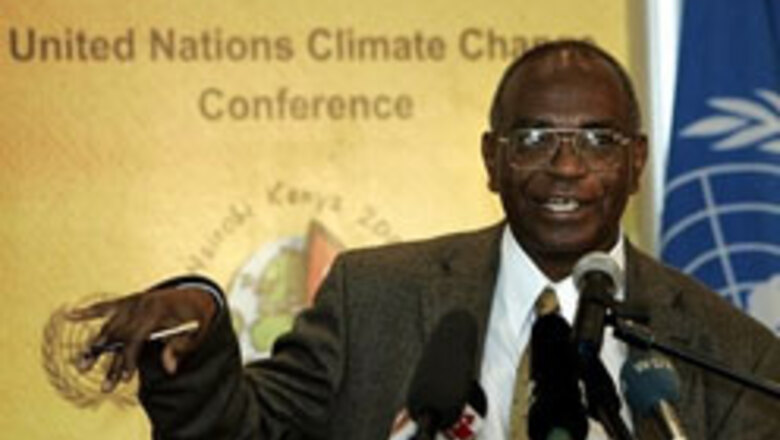
views
Nairobi (Kenya): Facing rising temperatures and flagging efforts to control greenhouse gases, thousands of delegates from around the world opened a UN conference Monday on next steps to ward off the worst effects of climate change.
Many at the two-week session will look for signs the United States might ease its stand against mandatory reductions in emissions that scientists blame for global warming.
Few expect to see such a change, however, while the Bush administration is in power.
The delegates will get a closed-door preview, meanwhile, of the latest scientific findings on a warming world, to be published next year in a comprehensive UN assessment by the world's leading climate scientists.
Among more recent results:
- World temperatures have risen to levels not seen in at least 12,000 years, propelled by rapid warming the past 30 years, US climate scientists reported in September.
- NASA last month reported "dramatic" melting of Greenland's ice mass, at a rate of 41 cubic miles per year, far surpassing the gain of 14 cubic miles per year from snowfall.
- Britain's Hadley Center for Climate Prediction and Research forecast last month that extreme drought could eventually affect one-third of the planet if climate change is not reined in.
Scientists blame the past century's 1-degree-Fahrenheit rise in average global temperatures at least in part on the accumulation of carbon dioxide, methane and other heat-trapping greenhouse gases in the atmosphere — byproducts of power plants, automobiles and other fossil fuel-burning sources.
The 1997 Kyoto Protocol, an annex to the 1992 UN climate-change treaty, requires 35 industrialised countries to reduce those emissions by five per cent below 1990 levels by 2012.
A UN report last week indicated many countries are struggling to meet their targets.
Industrialised nations' emissions declined in the 1990s after the collapse of the Soviet bloc and the shutdown of polluting factories and power plants in eastern Europe.
However, now those economies are rebounding, contributing to a 2.4 per cent rise in emissions by all industrialized nations between 2000 and 2004, that report said.
PAGE_BREAK
Here in Nairobi, the Kyoto countries will continue talks on what kind of emissions targets and timetables should follow 2012.
However, many are waiting to see whether the biggest emitter, the United States, accounting for 21 per cent of the world's greenhouse gases, will submit to a mandatory regime of cutbacks.
President Bush once cited scientific uncertainty about climate change in rejecting the Kyoto Protocol.
However, today "the science is no longer contested,"head of the UN Environment Program, Achim Steiner said here Sunday.
In fact, he said that the scenarios of five or 10 years ago "have had to be revised not downward, but upward."
The Bush administration still objects to Kyoto-style mandates because, it says, they would hamstring US economic growth and because poorer countries are exempted from the controls.
In counterpoint to this, a British government study released last week predicts the damage from unabated climate change will eventually cost between five per cent and 20 per cent of global gross domestic product each year.
In an effort to draw Washington into an international emissions-control regime, a broad "dialogue" was instituted last May involving all treaty countries, including the United States, in talks about ways to confront global warming. Those discussions will continue here.
Much of the Nairobi conference will be devoted to technical matters, such as organising the Adaptation Fund, intended to help poorer countries grapple with climate change- by financing the building of walls against rising seas, for example, or switching to drought-resistant crops.
Africa-already on the edge environmentally- is the continent expected to suffer most from shifting climate zones and droughts, like the one now in its fourth year in East Africa.
"The impacts are increasing every year in frequency and intensity, and every year we're feeling we're less able to cope," head of the advocacy group Climate Network Africa, Grace Akumu said.


















Comments
0 comment